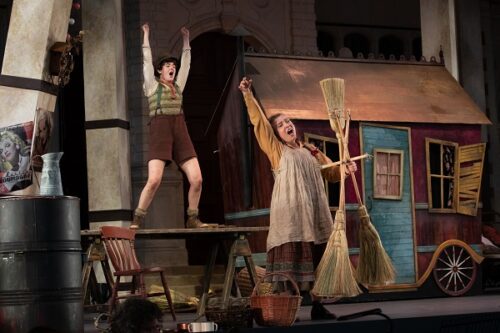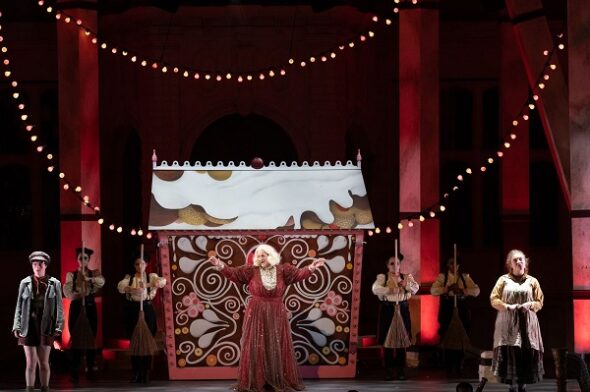 United Kingdom Opera Holland Park 2023 [2] – Humperdinck, Hansel and Gretel: Soloists, Opera Holland Park Chorus (chorus master: Dominic Ellis-Peckham) and Children’s Chorus (chorus master: Scott Price), City of London Sinfonia / Kărin Hendrickson (conductor). Holland Park, London, 14.6.2023. (MB)
United Kingdom Opera Holland Park 2023 [2] – Humperdinck, Hansel and Gretel: Soloists, Opera Holland Park Chorus (chorus master: Dominic Ellis-Peckham) and Children’s Chorus (chorus master: Scott Price), City of London Sinfonia / Kărin Hendrickson (conductor). Holland Park, London, 14.6.2023. (MB)

Production:
Director – John Wilkie
Designs – Neil Irish
Lighting – Robert Price
Movement – Michael Spenceley
Cast:
Hansel – Charlotte Badhma
Gretel – Laura Lolita Perešivana
Peter – Paul Carey Jones
Gertrud – Meeta Raval
The Gingerbread Witch – Eleanor Dennis
The Sandman – April Koyejo-Audiger
The Dew Fairy – Charlotte Bowden
It is always a joy to return to Holland Park: to Opera Holland Park, that is, the park itself being available all year around. Sometimes, the sense of it heralding summer can seem wildly optimistic; doubtless it did for those initially sampling the year’s first production, Rigoletto. Now that spring has finally not come, winter having suddenly jumped into summer, the season’s second, Hansel and Gretel, was able to bask in that long-anticipated magic of sunshine and warmth gradually ceding, peacock cries and all, to nightfall for the final act.
Hansel, of course, is so magical a work that temptation can be to love it too much. Occasionally during the first two acts, I wondered whether conductor Kărin Hendrickson might be heading in that direction: not that, if I am honest, I mind. Someone taking her time is increasingly rare in music of many kinds, and the last thing one wants here is someone rushing us through the opera’s relatively few minutes. If I were to be excessively critical, I might say that there were a very few occasions when the score felt as if it were on the verge of losing momentum, though I am not sure it ever quite did. Instead, Hendrickson was setting up a considerable and welcome contrast with the antics and resolution of the third act, wrapping things up nicely, having allowed us to enjoy the ride. The City of London Sinfonia played like a little more than ‘fourteen angels’. Though a small band – notably smaller (strings 5:4:3:2:2) than we generally hear, and in a trickier acoustic too – they offered a dynamic and related emotional range to match any. It seemed clear that they enjoyed playing for Hendrickson — and doubtless to play such ‘late-Romantic’, for want of a better term, music too. If we want to hear the Staatskapelle Dresden and Colin Davis, we can go to the recording, but then we shall miss live performance and magical setting.
A likeable, characterful cast singing the original German added much to the proceedings. Charlotte Badhma and Laura Lolita Perešivana complemented and contrasted each other in just the right ways, vocally and gesturally, as Hansel and Gretel. Paul Carey Jones’s positively Wagnerian Peter was luxury casting; indeed, here is a singer who knows how to make his voice carry, even many yards offstage, and yet there is no lack of flexibility, quite the contrary. Meeta Raval revealed a lyric soprano with distinct dramatic flair as Gertrud. Eleanor Dennis had a whale of a time as the Witch, in a performance as well sung as it was acted. April Koyejo-Audiger’s Sandman and Charlotte Bowden’s Dew Fairy eagerly took their chances to shine, as did members of the Opera Holland Park Chorus and a children’s chorus from the Cardinal Vaughan Memorial School. Above all, this was a collaborative and sustainable performance.

For better or worse, productions of this work tend to shy away from its darkest subtexts. John Wilkie’s was no exception here. I admit to not being entirely sure what Wilkie’s concept was. Updated to the interwar years, there seemed in the first scene to be an interest in the family’s poverty, albeit an interest not really sustained. Fairytale, dream-like characters had already appeared in the Overture, lending a sense of mystery; their choreographed return at the end of the second act seemed less motivated. I suspect something psychoanalytical was intended. For whilst this was certainly no militantly traditionalist staging, an overall framework eluded me, as did the significance of the Witch peeling off exaggeratedly ‘feminine’ clothing to reveal a ‘masculine’, albeit highly caricatured military uniform. Fascism, I suppose, though more of a Fawlty Towers variety than something more sinister — or meaningful. In any case, she was soon gone. Perhaps that was the point; if so, it was a distinctly odd one. None of this detracted unduly, though, in what remained a lovely yet not too lovely evening, sampling ideas that might yet be considered a little more seriously and/or magically.
Mark Berry
